Ccrn test stuvia Study guides, Class notes & Summaries
Looking for the best study guides, study notes and summaries about Ccrn test stuvia? On this page you'll find 5 study documents about Ccrn test stuvia.
All 5 results
Sort by
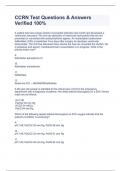
-
CCRN Test Questions & Answers Verified 100%
- Exam (elaborations) • 32 pages • 2023
- Available in package deal
-
- $11.99
- + learn more
A patient has had a large anterior myocardial infarction last month and developed a ventricular aneurysm. He now has episodes of ventricular tachycardia that are not prevented or converted with antidysrhythmic agents. An implantable cardioverter-defibrillator (ICD) is implanted. Four days after surgery he develops ventricular tachycardia. The ICD has delivered three shocks but has not converted the rhythm. He is pulseless and apneic. Cardiopulmonary resuscitation is in progress. What is the prio...
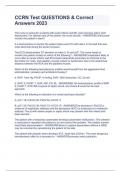
-
CCRN Test QUESTIONS & Correct Answers 2023
- Exam (elaborations) • 22 pages • 2023
- Available in package deal
-
- $10.99
- + learn more
The nurse is caring for a patient with acute inferior wall MI, post-coronary artery stent deployment, For optimal care of the patient, the nurse should: - ANSWERSContinuously monitor the patient in lead II It is best practice to monitor the patient status post PCI with stent, in the lead that was most abnormal during the acute occlusion. The ECG demonstrates ST elevation in leads II, III and aVF. The nurse needs to monitor the patient closely for which of the following? - ANSWERSComplicati...
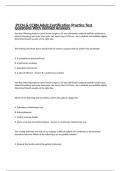
-
PCCN & CCRN Adult Certification Practice Test Questions With Verified Answers
- Exam (elaborations) • 17 pages • 2023
- Available in package deal
-
- $11.99
- + learn more
One day following posterior spinal fusion surgery a 35 year old female suddenly exhibits restlessness, labored breathing and acute chest pain. Her heart rate is 122/min., she is afebrile, and exhibits slightly diminished breath sounds on the right side. The findings described above should lead the nurse to suspect that the patient has developed: A. A spontaneous pneumothorax B. A pulmonary embolus C. Aspiration pneumonia D. A pleural effusion - Answer B. A pulmonary embolus One day f...
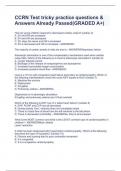
-
CCRN Test tricky practice questions & Answers Already Passed(GRADED A+)
- Exam (elaborations) • 37 pages • 2023
- Available in package deal
-
- $9.99
- + learn more
How do young children respond to decreased cardiac output? (cardiac 3) A. SV and HR are increased B. SV and HR are decreased C. SV stays the same and HR is increased D. SV is decreased and HR is increased - ANSWERSC The majority of cardiac arrests in kids are due to - ANSWERSRespiratory failure Adrenergic stimulation is one of the compensatory mechanisms used when cardiac output fails. Which of the following is a result of adrenergic stimulation? (cardiac 6) A. Longer diastolic per...
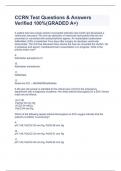
-
CCRN Test Questions & Answers Verified 100%(GRADED A+)
- Exam (elaborations) • 32 pages • 2023
- Available in package deal
-
- $9.99
- + learn more
A patient has had a large anterior myocardial infarction last month and developed a ventricular aneurysm. He now has episodes of ventricular tachycardia that are not prevented or converted with antidysrhythmic agents. An implantable cardioverter-defibrillator (ICD) is implanted. Four days after surgery he develops ventricular tachycardia. The ICD has delivered three shocks but has not converted the rhythm. He is pulseless and apneic. Cardiopulmonary resuscitation is in progress. What is the prio...

That summary you just bought made someone very happy. Also get paid weekly? Sell your study resources on Stuvia! Discover all about earning on Stuvia


